Month 9:21, Week 3:6 (Sheshi/Kippur), Year:Day 5949:256 AM
2Exodus 6/40
Gregorian Calendar: Sunday 17 November 2019
New Testament Studies
The Complete Messianic Evangelical
New Testament Phronema Study Series
10. Fasting, the Temple & the Bride (Mark 2:18-22)
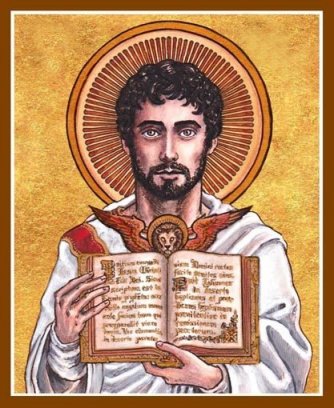
Continued from Part 9 (Mark 2:13-17)
Introduction
Welcome to the 10th part of this New Testament Phronemic Study Series as we resume our examination of a cluster of 'offences' that makes up five 'controversy' stories that signal the start of the end of the old ways of being and doing things, and the beginning of the new Kingdom brought by Yah'shua (Jesus). And these, as we're seeing, are slowly but surely - and at an ever increasing pace - putting Yah'shua (Jesus) on a collision course with the religious and political authorities, who don't want the new, who don't want change, who want to cling on to the old. And this collision is happening in a way designed to eventually send Him to the cross. 2,000 years on, the substance of the particular 'offense' we are examining today continues to agitate both evangelicals and messianics in different ways who have not always understood what's going on.
The Challenge to Mature
Already we are noting two facets of Yah'shua's (Jesus') behaviour that completely separate Him from the pious Yehudim (Judahites) of the time. The likes of this particular navi (prophet) have never seen seen before. As you put yourself in the shoes of those present at the various incidents, both family members who thought they knew Him and onlookers who clearly didn't, you at once experience a curious blend of puzzlement and offense. They don't understand why He's stirring the pot, why He's being so provocative, and yet He's not doing this for provocation's sake because He likes 'pushing people's buttons'.
Good Parenting
He's behaving this way because that's what a good parent does. No eaglet likes to be pushed, apparently heartlessly, out of the nest, yet that's the only way it can learn to fly. Most people don't want to grow up. The call to maturity challenges us all. And maturation, in religion as in everything else, can't be postponed indefinitely just because we don't want the discomfort. And, yes, growing up is uncomfortable, and it's something that's part and parcel of life in mortality. It isn't easy but it's absolutely worth it. As we'll see later, Yah'shua's (Jesus') attitude toward His own family at times really shocked them too (Mt.8:21ff. & Lk.9:59-62; Mt.10:37 & Lk.14:26; Mt.19:29 & Mk.10:29 & Lk.18:29). Not only that, but He would be found eating and drinking with all sorts of people and in all sorts of situations that ruffled the most highly preened of feathers. Good parents - good teachers - don't itch ears, they metaphorically box them with emet (truth) until they're satisfied their younglings can stand independently on their own two feet.
Respectable Society
Last week we found the Master celebrating with tax collectors and other social outcasts like prostitutes who had chosen to follow Him. And they followed Him because He spoke emet (truth) and because He loved them. In other words, He kept company with people who were normally on or beyond the borders of respectable society. He saw what these dregs of society could become if only loved and spiritually cultivated in the right way - the new way - whereas the rest of society were ready to discard them. And you have to remember that in His day and culture - 1st century 2nd temple Judaism - 'respectable society' meant not only social respectability but religious uprightness, proper covenant behaviour, loyalty to traditions and thus to the aspirations that Israel then had. And the fact that the pious of His day were regularly offended by His behaviour forces us to examine this more carefully.
Learning About True Piety and Kingdom of Heaven Mechanics
In what ways was the piety of that time right and in what ways was it wrong? What was, and is, authentic piety and what was, and remains, fake? Last time it was His table fellowship that got shocked people abuzz with talk but this wasn't just a once off occasion. This would become a striking feature of His way of doing Kingdom business and we're supposed to take note of that. And in particular, we're supposed to notice the comments people made about Him and the way He responded to them so that we can get to the heart of sinful attitudes and find the best solutions. Why is this important? Because what Yah'shua (Jesus) was doing was not simply introducing us to a fresh view of righteous Torah living but, far more than that, what the Master did at table is showing us an important facet of how the Kingdom was being inaugurated. We're being taught the metaphysics - the spiritual mechanics - of the Kingdom of Heaven!
Yah'shua's Four Big Redefinitions
There are four big things going on in this manifestation of Yahweh's authentic Kingdom that we need to be aware of. What I hope you'll see - and this presupposes some knowledge on your part of the Tanakh (Old Testament) which ideally we should have started our study with, but which isn't practical because of the time constraints - what you need to understand is that Yah'shua (Jesus) is:
- 1. Redefining the nation of Israel;
- 2. Redefining the family;
- 3. Redefining the Torah; and
- 4. Redefining the Temple.
How Torah Defined the Nation
Let me very briefly explain with an example. In those days, and in the centuries before, Torah defined the nation of Israel. The works of Torah served as a kind of symbolic system of accepted practice. What people did - the way they lived (observing the Sabbath, circumcising their newborn, living the kosher laws, observing the festivals, paying tithing, etc.) became a set of badges, rather like the cloth patches and metal medals that soldiers wear on their uniforms (that inform you of their rank or tell you what they have done or achieved) and demonstrated both to fellow observant Israelites and to their pagan neighbours that they were indeed the 'People of the Covenant'.
Birth of a New Covenant Torah and Phronema
But for Yah'shua (Jesus) and His followers, even though they would continue to do all of these things (minus the fulfilled and therefore abolished Levitical ceremonial law following His death and resurrection), the symbolic code of accepted practice that would distinguish His talmidim (disciples) from other Israelites - the set of badges that they would be seen to be wearing - would be defined by a new kind of Torah which, though it would include and continue the morality of the old lifestyle, would now be primarily identified by the Code of Behaviour set out in the Sermon on the Mount, a New and more complete form of Torah. This New Code - this New Covenant Torah - would include, as its primary defining characteristic, a completely new phronema altogether, a new spirit, a new spiritual hallmark, a new driving force, a new invisible identifying character infused into the heart, a miniature duplicate of the Saviour's nature and substance both manufactured in, and exclusively obtainable - directly, supernaturally - from Heaven. No human being would be able to impart it.
New Defining Characteristics
This new Israelite Family would come to view themselves, and at length come to be viewed by others, as a New Exodus, a new returned-from-exile people, a people who had received mercy and forgiveness and who were now, in their turn, to demonstrate the same kind of mercy and forgiveness in their new family relationships. And whilst the Saviour's new form of Table Fellowship did not replace the original kashrut laws, requiring physical separation from gentiles, these clean food laws ceased to be a main distinguishing 'badge' of identity. At the heart of everything lay mercy and forgiveness by which the talmidim (disciples) were now to be characterised and by which New Covenant Israel under King Yah'shua (Jesus) would be identified to the world. Whereas before they had simply been known as "a people Yahweh has blessed" (Isa.61:9, NIV), by this newly implanted divine chayim, zoë, or love "all men will know that you are My talmidim (disciples), if you love one another" (John 13:35, NIV). Simply doing x,y,and z in the Torah rule book would no longer be enough. I'll talk more about this as we get deeper into the Gospels but for now please be aware of what Yah'shua (Jesus) is transitioning out of or from and how the new Messianic Israel is being transitioned or phased in because it's a gradual process, and not necessarily a single event.
Mark 2:18-22
With that backdrop and reminder, let's read today's text in the Kingdom New Testament (KNT) and see what the next controversy is all about:
"John's talmidim (disciples), and the Pharisees' talmidim (disciples), were fasting. People came and said to Yah'shua (Jesus), 'Look here: John's talmidim (disciples) are fasting, and so are the Pharisees' talmidim (disciples); why aren't Yours?' 'How can the wedding guests fast', Yah'shua (jesus) replied, 'if the bridegroom is there with them? As long as they've got the bridegroom with them, they can't fast. Mind you, the time is coming when the bridegroom will be taken away from them. They'll fast then all right. No one sews unshrunk cloth onto an old cloak. If they do, the new patch will tear the old cloth, and they'll end up with a worse hole. Nor does anyone put new wine into old wineskins. If they do, the wine will burst the skins, and they'll lose the skins altogether. New wine needs new skins'" (Mk.2:18-22, KNT; also Mt.9:14-17; Lk.5:33-39 [1]).
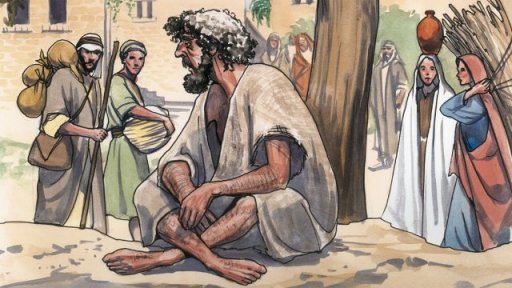 To fast or not to fast?
To fast or not to fast?
Cities vs. the Countryside
Now before we carefully dissect this, and remembering that this event takes place in Galilee, you need to be aware that there were regional differences in religious attitudes, just like there are in most countries. Look at the differences in politics between the city and the countryside. Look where evil concentrates itself the more readily. Remember, Yahweh did not build the first cities. Who can tell me who built the first city? Nimrod. And why did he build a city? To get better control over people and to consolidate totalitarian power. Because people are huddled so tightly together in cities, there is a completely different mindset. There is more dependence on the services the state provides. In the country people are more independent and self-reliant, and less easy to monitor and regulate.
Power Base of the Temple
It isn't immediately obvious but the context of what Yah'shua (Jesus) says here, though unspoken in our text, has actually to do with the Temple at Jerusalem and the implied power structure behind it. And you will hopefully not be surprised, since it should now be obvious that He is redefining everything else, that Yah'shua (Jesus) is also redefining the doctrine of the Temple. They don't know it yet, but in 15-20 years from the time Mark wrote the Gospel, about 40 years after Yah'shua (Jesus) spoke these words about fasting, that the temple would be destroyed - burned to the ground and raised by the Romans. He who controlled the temple controlled the nation and the people. But without that central edifice, what would the controlling power do?
Regional Theological Differences
Now the temple was to Judea (where the temple was located and where nearly all the religious leaders lived) what the Torah was to Galilee, at least in terms of the symbols by which the life of the Yehudi (Judahite) people in the two areas was structured. Just like Baptists who lay stress on studying the Word and charismatics who lay stress on the gifts of the Spirit, loyalty of the Temple in Judea was mirrored or paralleled by loyalty to the Torah in Galilee. That's why knowing where certain things were said by the Master is important to fully understanding them. We're in Galilee now, where the Torah holds predominant sway, but in Jerusalem and Judea, where the temple was 'local', as it were, the Temple was supreme. Something that is more visible and tangible inevitably grabs the attention more than something that isn't, at least of carnal man.
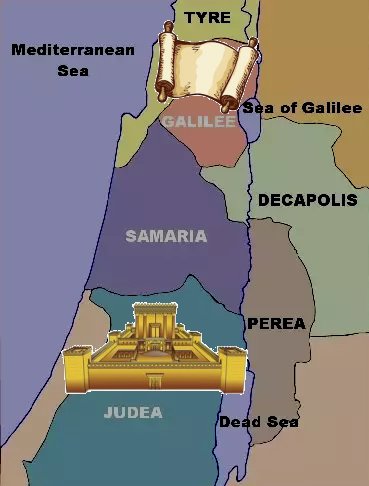 Differences in regional theological emphasis
Differences in regional theological emphasis
Rehoboam's Cunning
That is why apostate Rehoboam, who became king of the breakaway northern Kingdom of 10-tribed Israel after Solomon died, who knew the powerful symbolic importance of the Temple in Jerusalem in Judah, took immediate steps to build a rival worship system in the form of golden calves in the south of his country at Bethel, and in the north at Dan, and ordered his people to make sacrifices there at a counterfeit Feast of Sukkot (Tabernacles) (1 Ki.12:25-33). That way, he reasoned, his people would not need to go to the rival Kingdom of Judah which inherited the Temple. His was primarily a political move. It was clever - politically - but disasterous spiritually for the 10 tribes, which is why Israel went into apostacy and was carried off captive long before Judah.
North-South Divide
So until AD 70 and the destruction of the Temple, the Torah remained firmly in second place in the south, existing somewhat in the shadow of Herod the Great's magnificent Temple which he had enlarged to curry favour with the people. Like Jeroboam, his had been a shrewd political move, since he had been an illegitmate and unpopular puppet-king of the Romans. Yah'shua's (Jesus') later actions in the Temple in Jerusalem will thus come to function symbolically in more or less the same way as His actions and words concerning the Torah when up north in Rehoboam's former kingdom of Galilee-Samaria. In the north, where Torah was 'the main thing', they would yet have to face what for them would be the 'horror' of the entire Mosaic or Levitical system of priesthood and animal sacrifices being permanently terminated (which of course lay at the heart of Temple worship too) just as in the south they would soon have to adjust to the Temple being levelled to the ground.
A Complete Institutional Change
In other words, what we are being prepared for by the Master is a complete change in the religious institution. Indeed, with the arrival of the Kingdom, the replacement of the old institution was firmly underway only the religious leaders didn't know it yet. Nevertheless, like all nervous autocrats, they wanted all rivals stamped out before they could mount a serious challenge to their positions of power. The tragedy today is that there are Christians and Messianics only too keen to rebuild that divinely demolished institution by building a 'third' temple in Jerusalem in what amounts to a rejection of Yah'shua the Messiah (Jesus Christ) on the part of those zionists who support this antichrist project in the Middle Eastern Rothschild Illuminist state of 'Israel'.
False Dichotomies
So what's going on here in this fasting incident which is recorded in all three of the synoptic gospels (Matthew, Mark and Luke)? John's talmidim (disciples) and the Pharisees' talmidim (disciples) were all fasting but Yah'shua (Jesus) and His followers were not. The difference had nothing to do with patterns of religion. It was not, as some wrongly suggest, that the two fasting groups were concerned with outer observances, while Yah'shua (Jesus) was concerned only with the inner attitude of the heart. Nor is this a case of the two fasting groups simply be dismissed as legalist asceticism (austerity) versus Yah'shua's (Jesus') free-and-easy hippy-like lawless antinomians. This isn't a law-conscious Catholic or Messianic vs. a lawless Protestant 'thing'. This would be a false dichotomy, a 'good cop/bad cop' set up.
Fasting Over the Destruction of the Temple
How do we know this isn't what's being reported here by Mark? Because fasting in 1st century Judaism was not simply an aescetic discipline. It wasn't part and parcel of the 'piety scene'. They mostly didn't do it for the same reasons we do today, namely, to get closer to Elohim (God). It had everything to do with the present condition of Israel as a nation under foreign occupation, as a nation in exile again - in its own territory, yes, but not free, a bit like us, really. But more specifically, the talmidim (disciples) of John and the Pharisees were fasting for a specific reason: they were commemorating the destruction of the Temple by the Babylonians in 587 BC, some 600 years before. This enables us to accurately date the time of year the incident took place. All you have to do is check the dates of the minor Yehudi (Judahite) festivals of the southern Kingdom of Judah, and specifically the exact day they fasted on the anniverary of the Destruction of the Temple on 9th day of the 5th month (2 Ki.25:8-9; Jer.52:12-13)! So this would have been around our July time.
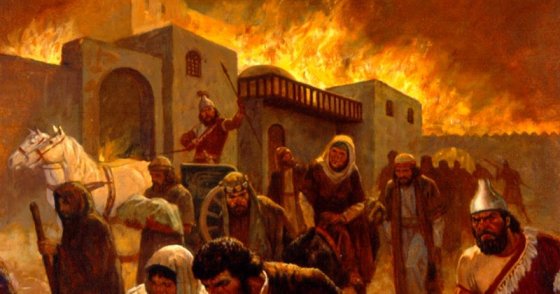 The Scribes and Pharisees were fasting in memory of the
The Scribes and Pharisees were fasting in memory of the
destruction of the Temple by the Babylonians
The Prophecy of Zechariah
Moreover, the navi (prophet) Zechariah's prophecy that these fasts of mourning would turn into feasts of celebration would only come true when Yahweh restored the fortunes of His people:
"Then the word of Yahweh of hosts came to me, saying, 'Thus says Yahweh of hosts: The fast of the fourth month, the fast of the fifth, the fast of the seventh, and the fast of the tenth, shall be joy and gladness and cheerful feasts for the house of Judah. Therefore love emet (truth) and shalom (peace)'" (Zech.8:18-19, NKJV; EB, p.1308).
Yah'shua Fulfills the Prophecy
And that is the meaning of Yah'shua's (Jesus) cryptic comment:
"How can the guests of the Bridegroom fast while He is with them? They cannot, so long as they have Him with them...No one sews a patch of unshrunk cloth on an old garment. If he does, the new piece will pull away from the old, making the tear worse. And no one pours new wine into old wineskins. If he does, the wine will burst the skins, and both the wine and the wineskins will be ruined. No, he pours new wine into new wineskins" (Mark 2:19, 21-22, NIV).
The Bridegroom's Self-Disclosure as Messiah
In other words, the party is in full swing, and nobody wants glum faces at a wedding. This is not a piece of 'teaching' about 'religion' or 'morality' and neither is it the dissemination of some timeless truth. There's nothing deep and mystical about it. It's a claim about eschatology (death, judgment, heaven and hell) - the Saviour is pointing to the prophecy made by the navi (prophet) Zechariah and saying, "This passage is fulfilled in your midst! The exile is over. The Bridegroom is here, now!" This is the way Yah'shua (Jesus) is disclosing Himself as the Messiah one little revelation after another, and He does so in such a way as to grab peoples' attention by being provocative, but also by not choking them with too much meat such that they cannot handle it!
Trained Not to Recognise the Truth
This is how His controversial claim as to who He actually is - the Son of Elohim (God) - is being made publicly visible. But people have not been trained to think this way. They're stuck in this deep, muddy rut of uninspired rabbinical thinking. They don't get it because it's so contrary to the way they have been theologically educated and that is why in our own time so many Christians and Messianics still don't 'get' what Yah'shua (Jesus) is up to because they're stuck in the ruts of their own traditions too. Here He is telling them that Israel's hope was being realised before their eyes whilst all along they remain blind. Here He is telling them that the Temple is being rebuilt but they are blind because the only Temple they have been taught to understand is the physical stone Temple of Herod the Great which would be gone - eradicated - in less than 40 years' time. These people had got so used to living in metaphorical, spiritual 'exile' that they could not hear the message of liberation. They were completely deaf. And so they remained in 'exile' - in spiritual bondage.
Forgiveness is Linked to Eschatological Blessing
This is a very big and important emet (truth) that I need to convery to you today. It connects back to the earlier incident when Yah'shua (Jesus) claimed to be able to provide forgiveness (Mk.2:1-13). And it's much more to do than with Him being Elohim (God) and therefore entitled to remit sins. You see, forgiveness in the Israelite tradition is also to do with an eschatological blessing - forgiveness comes, in its fullness, at the end of the æon or age. The fact that forgiveness is happening - the fact that Yah'shua (Jesus) is doing it in His capacity as Elohim (God) - is as much to do with Him being Divine as it is with the fact we're being given a signpost telling us that THE END OF THE AGE IS NIGH, not in a negative way, but in a good way for those who believe, for those who love and who choose to obey.
The End-Times, the End of Exile, and Qumran
And this is a theological emet (truth) that so many miss: the end-times began when Yah'shua (Jesus) began His mortal ministry. We've been in the end-times for the last 2,000 years! That may seem a long time to you but on the cosmic scale, it's right at the end. The return from spiritual exile began in these texts we are reading and we are a part of those end-times, right now, just like our Christian forefathers were. We know that this is how the Yehudim (Judahites) thought in the 1st century AD because the authors of the Dead Sea Scrolls also taught the idea that the returning exile people received forgiveness of sins [2]. The fact that the Essenes of Qumran who wrote and/or compiled the Scrolls falsely believed they were that special group is neither here nor there. What's important is that we know historically that that is how the Yehudim (Judahites) thought.
A More Accurate Theology of Eschatology
It is not hard, then, to grasp that an eschatological navi (prophet) like John the Baptist or Yah'shua (Jesus) offered their followers the same thing. Do you see how important doing accurate history is to doing equally accurate exegesis? Again, the passage we are studying today has little to do with actual fasting but is about the permanent end of the Mosaic Temple and Levitical Priesthood, the beginning of the end of spiritual exile, and the forgiveness that comes with the end of that exile! Out of this will come the fully fledged understanding and Christian doctrine of the forgiveness of sins through trusting in Messiah!
Dismantling the Zionist Lie
Now the reason I am stressing all this to you today is because the subject matter is actually much greater and more controversial. What Yah'shua (Jesus) is actually doing here that is of importance to us in the early 21st century is that He is totally invalidating and disqualifying modern Zionism.
Ending the Levitical and Corrupt Rabbinical Systems
So what Yah'shua (Jesus) is doing here in these first two chapters of the Gospel of Mark, and especially in today's text, is dismantling the monopoly of the corrupt rabbinical system, with its centre in the Levitical Priesthood and the Temple. Not that these were ever 'wrong' but because these were only ever shadows of the Messiah. And because the Messiah was now Himself present, they had to go, with all the political and religious junk that had accumulated around them. That is why the Torah-teachers (Scribes) came all the way down from Jerusalem to Galilee to discredit Him. His whole ministry was undermining the absolute, exclusive claims of their city (which Paul would later describe disparagingly in Galatians 4:24-25 as the 'City of Hagar' which "is in bondage with her children" - NKJV) and the basis for its control, the Temple.
Serving Notice to the Rulers of the Synagogue of Satan
Yah'shua (Jesus) was effectively giving them a dishonourable discharge, saying, "You are dismissed! Go!" and they, and their angry demonic controlling spirits, were retorting, "No way! We're in charge here!" Had the Torah-teachers (Scribes) and P'rushim (Pharisees) been godly men, they would have gladly stood aside for the King of Kings and joyfully received the higher Melchizedek Order.
But they weren't interested in the things of the Ruach (Spirit). What mattered most to them was power, a reason why they and their modern Sabbatean-Frankist [3] descendants are described as the "synagogue of Satan" (Rev.2:9; 3:9) and why all political and religious movements that seek to glorify the City of Hagar in our day and who want to build another temple in it belong to, or otherwise endorse, that same synagogue. That's how serious this matter is. It's a matter of life and death. There are no grey in-between areas. That is why you have to forsake every last vestige of this compact with hell now otherwise you will inherit both the spirit and fearful condemnation of those early Torah-teachers (Scribes) and P'rushim (Pharisees). Do you understand why ministries like this are so murderously hated?
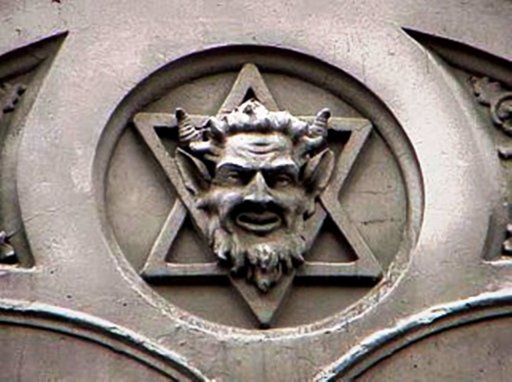 Identifying the synagogue of Satan in every generation is critical
Identifying the synagogue of Satan in every generation is critical
to doing accurate prophetic scripture exegesis
Dismissal of the Second Temple
There is more to this fasting incident than meets the eye. We have seen that, specifically, this has to do with the Temple and with its destruction by Babylon. Back then it was destroyed because of sin and rebellion; this time it is to be dismissed because it has served its purpose as a pointer to the Messiah Himself but is to be destroyed because its false leaders refused to cease operating it once it had been dismissed. This means, incidentally, that there can't be another Temple mandated by Heaven. Though what we call a Third Temple was offered in the days of Ezekiel (in reality, had it been built, it would have been the Second Temple) it was conditional upon repentance by both Judah and Israel. But they refused and the offer was cancelled.
Fasting as a Sign of Continuing Exile
Fasting was a sign that Israel was still in exile. Yah'shua (Jesus) brings the repentant sinner who is prepared to trust in Him out of spiritual exile and into rejoicing and feasting, which is what the Festival of Sukkot (Tabernacles) is calling us to. Next week we're going to begin to deal with the next controversial area that led to conflict, namely, the Sabbath (Mk.2:23-3:6), an issue which continues to divide Messianics and Evangelicals.
Much More Than a Call to Repentance
If all Yah'shua (Jesus) had come to do was to call sinners to mend their ways, as John the Baptist had done, and as all the nevi'im (prophets) before had done, the religious authorities would probably have left Him alone. Or would they? There's no guarantee of that given their treatment of the nevi'im (prophets) doing that very same thing over the centuries. But Yah'shua (Jesus) has come to do much more than that. He has come to completely overthrow a preparatory covenant along with the corrupt practices that have come to progressively hitch a ride like freeloading barnacles on a whale, or worse.
Mark 2:18-20, NKJV
Let's read through the passage again, this time in the New King James Version (NKJV):
"The talmidim (disciples) of John and of the P'rushim (Pharisees) were fasting. Then they came and said to Him, 'Why do the talmidim (disciples) of John and of the P'rushim (Pharisees) fast, but Your talmidim (disciples) do not fast?' And Yah'shua (Jesus) said to them, 'Can the friends of the bridegroom fast while the bridegroom is with them? As long as they have the bridegroom with them they cannot fast. But the days will come when the bridegroom will be taken away from them, and then they will fast in those days'" (Mk.2:18-20, NKJV; EB, p.1391).
Fasting Often to Bring in the Kingdom
The Yehudim (Judahites) of that time believed that fasting would hasten the arrival of the Kingdom of Elohim (God). Aside from the minor Yehudi (Judahite) festivals that we've already spoken of, the Pharisees (though not John's followers, hence we know that this incident isn't one of those occasions) used to fast on the second and fifth days of each week, much as a number churches like some Anabaptist groups I know still do. This they did, like I said, to hasten the arrival of the Kingdom. Yah'shua (Jesus), of course, knew this, so He was making a statement not just about the Commemoration of the Destruction of the Temple by the Babylonian invaders but was telling them, prophetically, that the Kingdom was now arriving with Him so they didn't need to fast anymore for that purpose either.
The Kingdom's Arrival
The Kingdom wouldn't happen all at once - in fact it will take the better part of 2,000 years - during nearly all of which time He would be absent, though He hasn't said that yet to His talmidim (disciples) (they had problems enough dealing with the prospect of an imminent departure even when they were maturer in the faith later on!). Nor would it be a gradual 'Kingdom Now'-type of process. Yah'shua (Jesus) will not be returning to a world full of faith but of unbelief, the Kingdom hanging around but dimly in a few faithful individuals until the Second Coming (Lk.18:8).
When to Fast Again
Once He had gone back to heaven, the talmidim (disciples) could resume fasting again (and would need to), for although the Kingdom was arriving with each new saved believer, it would not come fully until Yah'shua (Jesus) returned the second time with all the qodeshim (saints, set-apart ones). This would be a hard concept for the first believers to grasp in the same way it remains hard for most Christians and Messianics to grasp today because in this world there are two mutually exclusive kingdoms repelling one another like oil and water, each naturally and relentlessly repulsing the other - the Kingdom of Elohim (God) and the Kingdom of the Prince of Darkness. Indeed, as we all know only too well from personal experience, it all too often looks as though the Kingdom of Elohim (God) is either drowning or totally absent given the relentless persecution of the Light by the Darkness. Yet it always remains. The darkness can neither comprehend the Light nor overcome it (Jn.1:5).
Three Pictures of the New Beginning
Yah'shua (Jesus) is on earth at this time to preside over a birthing...which is also like the start of a new marriage. In order to explain what the 'new thing' that He has come to do was, He gives us in today's passage three images. Let's now read the concluding part so that we can tie the two parts together:
"No one sews a piece of unshrunk cloth on an old garment; or else the new piece pulls away from the old, and the tear is made worse. And no one puts new wine into old wineskins; or else the new wine bursts the wineskins, the wine is spilled, and the wineskins are ruined. But new wine must be put into new wineskins" (Mk.2:21-22, NKJV; EB, p.1391).
The Meaning of New Wine in Old Bottles
So we begin with the image of new wine in old bottles. Put new wine in old bottles and the bottles will burst and the wine be wasted. Remember, they used skins in those days, not glass. Why does Yah'shua (Jesus) use this imagery to explain what He is doing? What He brings is, as it were, 'new wine' but this new wine can't be fitted into their ways of thinking and living. In other words - and this is something Protestants understand but most Messianics don't as a rule - if you try to fit the New Covenant way of being, thinking, behaving, and living, into an Old Covenant mindset (along with all the Talmudic, rabbinical barnacles they have encrusted the old way of being with), you will end up with the worst of both worlds. And that's why so many modern experiments in the Messianic and Hebraic Roots Movement have been a disaster and they either revert to being Jews again (if that's where they came from) or to being Evangelicals, or worse. I've known many to descend into paganism! So this trying to keep the old bottles going is extremely dangerous spiritually! You have to be prepared to let it go completely and allow Christ to totally form you again. Don't be afraid to let Him do so. It's an exciting adventure!
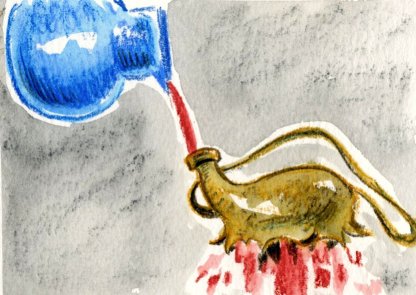
Not a Call to Lawlessness
Now don't misunderstand me - because it is so easy to get the wrong end of the stick here. I am not saying all Messianic groups fit into this 'impossible' category. It's more complex than that and we mustn't oversimplify - remember, remember, the talmidim (disciples) who gladly received the Kingdom Yah'shua (Jesus) brought them continued to live the Torah lifestyle. They didn't suddenly become lawless gentiles! They didn't become orthodox Christians! But what they didn't do was live it in the way the Yehudi (Judahite) religious leaders of the day did. This requires careful explanation, it's so important to get right, so please bear with me today - hear me out, if you would. If you can understand this it will make understanding and getting the most out of this Bible course all the easier.
A Radical Change in Thinking
So to be clear: Yah'shua (Jesus) was telling the people that this new, powerful Kingdom ministry couldn't possibly fit into their way of thinking, there and then in the 1st century AD, and specifically, into 1st century, 2nd Temple Judaism, and even more specifically, 1st century, 2nd Temple Galilean Judaism. Context is essential if we are going to make accurate sense of this. These Galileans needed to think differently, they neded to think bigger, and they needed to get hold of new metaphorical 'wineskins' for the new wine which He was offering. Let's not read more into this passage than is there. He's simply saying that what they had, there and then, was inadequate, so they would need to be trained to think in a NEW WAY. Most people are threatened by that kind of challenge. Most people would rather keep on thinking the way they are used to thinking, the way they have been trained to think by politicians, religious leaders, their parents, their culture, and the like. Yah'shua (Jesus) says: "No, if you want to follow Me, if you want to receive the Kingdom I am bringing, if you want forgiveness, if you want new life, you have got to be retrained." That's the issue here. And that retraining - that re-discipling - is what we're going to systematically and thoroughly learn, and we are going to do it before we try to figure out what the apostle Paul is all about!
The Meaning of the Clothes Patch
OK, the second image is about mending clothes. A brand new piece of cloth won't do to patch a hole in an old coat. As it shrinks with time and weathering, it will pull alway from the hole and make a worse rent or tear than before. This image is a little bit different from the wineskin one, though obviously similar. And without the wineskin image, it might be misunderstood. Taken in isolation, this image might at face value suggest that all you need is an old piece of cloth to fix the old garment, which is a good picture of that brand of Messianic Judaism which teaches and preaches a Renewed rather than a brand New Covenant. In other words, this image, completely isolated from the surrounding text, suggests that the old is good and the new is bad, which is obviously the reverse message Yah'shua (Jesus) is bringing. He doesn't talk about a 'renewed' wineskin for the new wine but a totally brand new wineskin, which is why this image comes before the one about the piece of clothing. The basic point that Yah'shua (Jesus) is making is this: the old and the new don't mix at all, like oil and water.
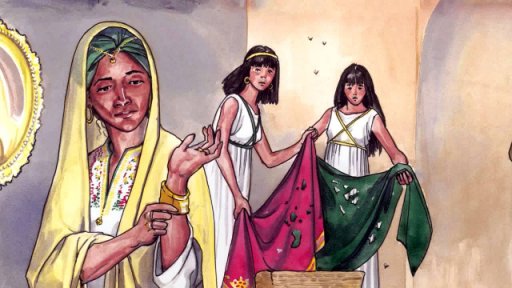 The parable of the clothes patch cannot be understood apart from
The parable of the clothes patch cannot be understood apart from
the parable of the wineskin and the Messianic marriage
Misunderstanding What Yah'shua Came to Do With the Law
And this is where Evangelicals and other orthodox Christians generally misunderstand. They teach that Yah'shua (Jesus) is not only permanently doing away with the Levtical Priesthood and Sacrificial system (which He absolutely was preparing to do) but they conclude that He was getting rid of the whole of the Torah (law) too - 'nailing it to the cross', is the metaphor Evangelicals like to use, when in reality it was the death penalty for breaking the Torah that was being removed, not the Torah itself! And that is where the third image comes in to settle the matter conclusively, in actual fact, the first image chronologically which I have deliberately left to last to underline the point, and that is the picture of a wedding, which takes us back to the question that sparked off the discussion with the religious leaders in the first place: "Why aren't you fasting like the rest of us?" We've answered that on a couple of levels already but now we need to consider the main - the most important - level which connects with the two images of the wine skin and the patch of cloth we just discussed.
The Bridegroom and the Wedding Celebration
Yah'shua (Jesus) is doing a couple of things here. He is comparing His own ministry - His public minisry and His own presence with His talmidim (disciples) - to a wedding celebration in which He is the Bridegroom. And He is explaining why His followers aren't keeping the religious leaders' regular fast days, and specifically, the fast commemorating the destruction of the 1st Temple, the Temple of Solomon, which was bigger and more lavishly decorated with gold and other precious things than the second smaller one built by Zerubabel after the return from exile in Babylon after Ezekiel's had been rejected.
Marriage and Yahweh's New World
Yah'shua (Jesus) introduces us here to the powerful allegory of a marriage which He will do time and time again, even after His resurrection when He reveals Himslf to the apostle John while he is in exile on the Isle of Patmos! He uses the marriage allegory not just because weddings are happy occasions on which to party (though that's obviously part of it) but because weddings - and marriage in general - say something at a very deep level about the goodness, ahavah (love) and lavish creativity of the Elohim (God) who made this world. Marriage, and the wedding that inaugurates it, is perhaps the closest analogy there is to explaining or describing the wonderful new world that Yahweh will eventually make, the world in which everyone will have more than enough, a world in which there will be peace and justice for all.
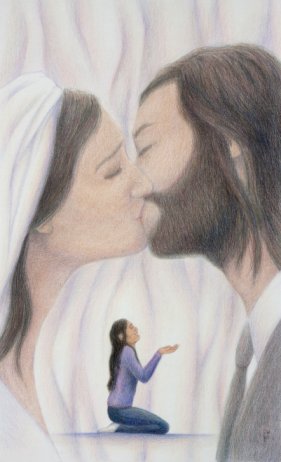
Betrothal Passages in the Tanakh
Yah'shua (Jesus) joins this image of Himself as being like a bridegroom to another ancient Israelite idea, namely, that Israel, as Elohim's (God's) people, is the bride of Elohim (God) - wayward, rebellious, sometimes running off with strangers, but eventually to be wooed and won back again. Here are three familiar scriptures from the Tanakh (Old Testament) in illustration:
"For as a young man marries a virgin, so shall your sons marry you; and as the bridegroom rejoices over the bride, so shall your Elohim (God) rejoice over you" (Isa.62:5, NKJV; EB, p.1016).
"Go and cry in the hearing of Jerusalem, saying, 'Thus says Yahweh: I remember you, the kindness of your youth, the love of your betrothal, when you went after Me in the wilderness, in a land not sown" (Jer.2:2-3, NKJV; EB, p.1026).
"'And it shall be, in that day,'
Says Yahweh,
"That you will call Me 'My Husband,'
And no longer call Me 'My Master,'
For I will take from her mouth the names of the Baals,
And they shall be remembered by their name no more.
In that day I will make a covenant for them
With the beasts of the field,
With the birds of the air,
And with the creeping things of the ground.
Bow and sword of battle I will shatter from the earth,
To make them lie down safely.
'I will betroth you to Me forever;
Yes, I will betroth you to Me
In righteousness and justice,
In lovingkindness and mercy;
I will betroth you to Me in faithfulness,
And you shall know Yahweh'" (Hos.2:16-20, NKJV; EB, p.1225).
A Plural Bride
And sometimes we find Yahweh allegorically married to more than one bride, to Judah and Israel (Jer.3:6-10; 31:31-32; Ezek.23:2-4), for instance, just as we find Jacob married to Leah and Rachel, and David to his seven brides which is a picture of the Seven Ruachot (Spirits) of Elohim (God). Similarly, Yah'shua (Jesus) likens Himself to being married to five faithful virgins, a picture of the Messianic Community (Church) (Mt.25:1-13).
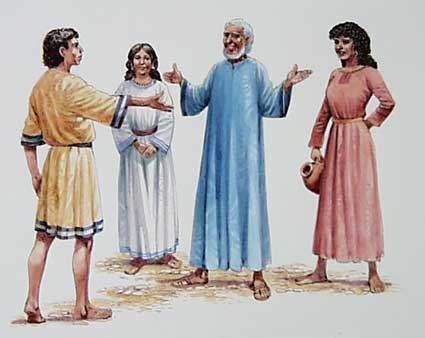 Jacob, Leah and Rachel with his father-in-law Laban
Jacob, Leah and Rachel with his father-in-law Laban
A Disturbing Message About Divinity
So when Yah'shua (Jesus) announced Himself as the Bridegroom, a position previously reserved only for Yahweh as Elohim (God), then there are disturbing new meanings in the air, at least for those 1st century Yehudim (Judahites)! He is not casting Himself as first among equals, nor as the leading member of the Twelve apostles. Rather, He is the one who calls them into existence and gives them their status and rôle, which in the Tanakh (Old Testament) is exactly what Yahweh has done! And although by this time, as the Targums attest, Judah's religious leaders were expecting the Messiah to indeed be divine, it was still a shock when a charismatic carpenter, miracle worker and exorcist from just down-the-road in Nazareth started dropping clear hints that He was both Messiah and Divine! Here is a perfect example, then, of new wine for old bottles to cope with.
The Mystical Marriage of Messiah
The apostle John who is, without a shadow of a doubt, the most mystically-minded of the followers of the Saviour and who has such a deep understanding of the heart of Yah'shua (Jesus), said this amongst many other things on the subject of what we Messianic Evangelicals call the '3M's' of the Mystical Marriage of Messiah:
"He who has the Bride is the Bridegroom; but the friend (John the Baptist) of the Bridegroom, who stands and hears Him, rejoices greatly because of the Bridegroom's voice" (Jn.3:29, NKJV)
The Two Brides
This is deeper than it may at first look as we'll see when we come to study the Johannine writings. It is the bride - the Body of Messiah - that must identify the Bridegroom to the world on one level by reflecting the New Creation Chayim (Life). The world can only 'see' Christ by seeing us imaging Him in our behaviour, and chiefly by our love for one another. But on another level it is the Divine Bride - the Ruach haQodesh (Holy Spirit) - that must reveal the Divine Bridegroom too (Eph.5:25-27; Rev.19:8-7) - to the one still walking in the Old Creation life. We must be drawn by the Divine Bride - the Ruach (Spirit) - the Dove that descended on Yah'shua (Jesus) at His baptism. We are to reflect the perfect humanity of Yah'shua (Jesus) in the same way that the Ruach (Spirit) bears witness of the Son of Elohim (God) to us by reflecting His perfection to us while He is absent from the earth. This is very deep stuff which you can learn more about on our Holy Echad Marriage website.
A Challenge
To conclude, let me leave you with a challenge. Everything must start afresh in Christ. Everything is made new. Old patches and old wineskins won't do because they're incompatible with the new requirements. When we receive Him, everything becomes different. But - and this is the big weakness we have - we have a tendency even after salvation to try and combine the new with the old, to combine Christ with the world, or with tradition, or with anything that will give us an excuse not to give ourselves completely to Him. And if you do that - if you compromise - you will lose everything, because the two can't mix. The old wineskin will burst, the new patch on the old cloth of your old life will just tear even more. You have to choose one or the other. I have seen so many people fall away to know what I am saying is true. When Yahweh does a new thing in Yah'shua (Jesus) in your life, when you are spiritually regenerated, you should join the divine party, not grumble because the new wine of the Besorah (Gospel) is destroying your old way of doing things. Let it. The old is supposed to be discarded. We're supposed to die to self and to the world. Wisdom comes in sorting out these contradictions and re-aligning our lives wholly to Christ on a daily basis. The alternative is death, and then it may be too late.
Conclusion
May Yahweh bless as you ponder these things. I look forward to seeing you for Part 11 at the same time next week. Amen.
Endnotes
[1] Also see parallel texts in the apocryphal Gospel of Thomas 47:1-5; 104:1
[2] 1QH 4:11-12; 5:4; 15:30ff., etc.
[3] The devil-worshipping, Illuminist cult that currently runs the hidden, deep state, political, religious and military-industrial complex, and consists mostly of Cabalist Jews and 'Gentile' Freemasons. It is named after its progenitors, Sabbatai Zvi (1626-1676) and Jacob Frank (1726-1791). Mostly known today as the 'Cult of the All-Seeing Eye', its adherents are committed to the anarchic destruction of mankind. It's satanic manifesto for world dominion is contained in the infamous Protocols of Zion
Continued in Part 11
Comments from Viewers
[1] "Thanks Chris ...for sharing the recording [of today's sermon] to your group. You have no idea what that means to me and how it encourages me as I continue to share my experiences here" (CS, UK, 17 November 2019)
Acknowledgements
[1] Tom Wright, Mark for Everyone (SPCK, London: 2001)
[2] D.E.Nineham, The Gospel of St.Mark; The Pelican New Testament Commentaries (Penguin Books, Harmandsworth, Middlesex, England: 1972)
[3] J.C.Fenton, The Gospel According to John in the Revised Standard Version (OUP: 1979)
[4] J.R.Dummelow, The One Volume Bible Commentary (Macmillan, NY: 1975)
[5] Thomas M.Mumford, Horizontal Harmony of the Four Gospels in Parallel Columns (Deseret, SLC, Utah: 1982)
[6] Hugh Anderson, The New Century Bible Commentary: The Gospel of Mark (Eerdmans, Grand Rapids, Michigan: 1981)
[7] Ed. Gerhard Kittel, Theological Dictionary of the New Testament - 10 vols. (Eerdmans, Grand Rapids, Michigan: 1976)
[8] N.T.Wright, The New Testament and the People of God: Christian Origins and the Question of God (SPCK, London: 2013)
[9] N.T.Wright, How God Became King: The Forgotten Story of the Gospels (Harper One, NY: 2012)
[10] N.T.Wright, Jesus and the Victory of God (SPCK, London: 1996)
[11] N.T.Wright, The Resurrection of the Son of God (SPCK, London: 2003)
[12] N.T.Wright, The Challenge of Jesus: Rediscovering Who Jesus was and Is (IVP Academic, Downers Grove, Illinois: 1999)
[13] Rev.Prof.F.Davidson (ed.), The New Bible Commentary (Inter-Varsity press, London: 1953)
[14] Ed. Margaret Dunlop Gibson, The Commentaries of Isho'dad of Merv, Bishop of Hadatha (c.850 AD) in Syriac and English, Vol. 1 (Cambridge University Press: 1911)

 V148
V148
|


